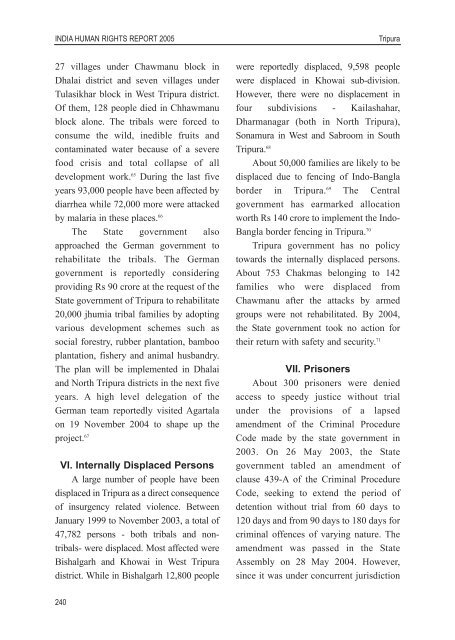annual report print final.qxd - Asian Centre for Human Rights
annual report print final.qxd - Asian Centre for Human Rights
annual report print final.qxd - Asian Centre for Human Rights
You also want an ePaper? Increase the reach of your titles
YUMPU automatically turns print PDFs into web optimized ePapers that Google loves.
INDIA HUMAN RIGHTS REPORT 2005 Tripura<br />
27 villages under Chawmanu block in<br />
Dhalai district and seven villages under<br />
Tulasikhar block in West Tripura district.<br />
Of them, 128 people died in Chhawmanu<br />
block alone. The tribals were <strong>for</strong>ced to<br />
consume the wild, inedible fruits and<br />
contaminated water because of a severe<br />
food crisis and total collapse of all<br />
development work. 65 During the last five<br />
years 93,000 people have been affected by<br />
diarrhea while 72,000 more were attacked<br />
by malaria in these places. 66<br />
The State government also<br />
approached the German government to<br />
rehabilitate the tribals. The German<br />
government is <strong>report</strong>edly considering<br />
providing Rs 90 crore at the request of the<br />
State government of Tripura to rehabilitate<br />
20,000 jhumia tribal families by adopting<br />
various development schemes such as<br />
social <strong>for</strong>estry, rubber plantation, bamboo<br />
plantation, fishery and animal husbandry.<br />
The plan will be implemented in Dhalai<br />
and North Tripura districts in the next five<br />
years. A high level delegation of the<br />
German team <strong>report</strong>edly visited Agartala<br />
on 19 November 2004 to shape up the<br />
project. 67<br />
VI. Internally Displaced Persons<br />
A large number of people have been<br />
displaced in Tripura as a direct consequence<br />
of insurgency related violence. Between<br />
January 1999 to November 2003, a total of<br />
47,782 persons - both tribals and nontribals-<br />
were displaced. Most affected were<br />
Bishalgarh and Khowai in West Tripura<br />
district. While in Bishalgarh 12,800 people<br />
240<br />
were <strong>report</strong>edly displaced, 9,598 people<br />
were displaced in Khowai sub-division.<br />
However, there were no displacement in<br />
four subdivisions - Kailashahar,<br />
Dharmanagar (both in North Tripura),<br />
Sonamura in West and Sabroom in South<br />
Tripura. 68<br />
About 50,000 families are likely to be<br />
displaced due to fencing of Indo-Bangla<br />
border in Tripura. 69 The Central<br />
government has earmarked allocation<br />
worth Rs 140 crore to implement the Indo-<br />
Bangla border fencing in Tripura. 70<br />
Tripura government has no policy<br />
towards the internally displaced persons.<br />
About 753 Chakmas belonging to 142<br />
families who were displaced from<br />
Chawmanu after the attacks by armed<br />
groups were not rehabilitated. By 2004,<br />
the State government took no action <strong>for</strong><br />
their return with safety and security. 71<br />
VII. Prisoners<br />
About 300 prisoners were denied<br />
access to speedy justice without trial<br />
under the provisions of a lapsed<br />
amendment of the Criminal Procedure<br />
Code made by the state government in<br />
2003. On 26 May 2003, the State<br />
government tabled an amendment of<br />
clause 439-A of the Criminal Procedure<br />
Code, seeking to extend the period of<br />
detention without trial from 60 days to<br />
120 days and from 90 days to 180 days <strong>for</strong><br />
criminal offences of varying nature. The<br />
amendment was passed in the State<br />
Assembly on 28 May 2004. However,<br />
since it was under concurrent jurisdiction



